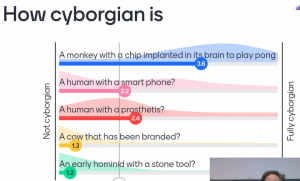It is late November in 2021 when a group of students led by their archaeologist professor discuss what a cyborg is. In an attempt to sense the sentiment in the lecture hall, the professor had his students rate several examples of what might be cyborgs. In order of least cyborg to most cyborgian the students rated an early hominid with a stone tool, a branded cow, a human with a smartphone, a human with a prosthetic, and most cyborgian a monkey with a brain implant.

The monkey by definition was a cyborg in the same way Alex Murphy and Steve Austin became cyborgs; scientists, who did not care about consent got to work on them.
Far more interesting is the difference between the human with a prosthetic and the human with a smartphone. Let me tell you why.
They are both cyborgs.
As this header suggests they are both cyborgs and I would love to leave room for discussion here, but I did not come up with the definition of what a cyborg is, I merely respect it. Look at what Clynes and Kline idea of the cyborg is: “The Cyborg deliberately incorporates exogenous components extending the selfregulatory control function of the organism in order to adapt it to new environments.”
I like to break this down to some components and start with deliberately. Humans pay to have a smartphone there is some conscious thought put into that phone. Some humans even chose to express they are more of an Android person or an OS person. These are both operating systems and not human features. For a prosthetic initial motivation might not be deliberate, but it brings me to the second part of incorporates exogenous components extending the selfregulatory control function of the organism. A prosthetic is an artificial body part and fits the exogenous part. Self-regulatory control function of the organism might translate to homeostasis as a prosthetic leg allows for a biped to stand erect or a hip can correct for an arthritic hip. The smartphone, one might argue, does not serve the same purpose and that might be why it was ranked below the prosthetic. It does not seem to hold the same psychical level of incorporation a prosthetic has. On the other hand having access to the internet and the ability to look up almost anything in the world does seem to take off at least some cognitive load of the human. My claim here is that since smartphones alter our cognitive abilities they fit the last part of the description. The exogenous component extends an otherwise self-regulatory control function of the organism in order to adapt it to new environments. The new environment in this case being the high-tech culture of the 2020s.
If this makes sense…
Then why aren’t we, smartphone in hand carrying humans, calling ourselves cyborgs?
This could be because of how we associate cyborgs as futuristic and scifi-related. Even now after we passed the futuristic dystopia of Blade Runner three years ago. This placement of cyborgs in the future allows us to not think too much about our current relationship and boundaries with machines. Donna Haraway did consider our status as cyborgs early on. In A Cyborg Manifesto she breaks down how evolutionist theories already exposed the intertwined boundaries between all species, she places remarks on how machine and human dependency advanced during the Industrial Revolution, and she explores how in high-tech culture devices become more part of the culture and the boundaries between the cultural and natural diminish. Basically we are already cyborgs.
From Haraway’s point of view allowing ourselves to be called cyborgs we are also allowing the deconstruction of gender and other social issues. She makes a solid point as it embraces an holistic approach to identity that is inclusive over exclusive. It is in this inclusive over exclusive attitude that I suppose the answer lies. If our idea of being a cyborg has to do with how it extends our capabilities and high-tech culture challenges this as it shows a fuzzy boundary between who makes and who is made, we now lean more towards the idea that allowing the machine is excluding the human and giving power to that is frightening to those who like to believe they are in power.
A theme we find often when it comes inclusion.
Maybe embrace your multitude. You are a cyborg. You are gaining by admitting it.


You say we associate the word cyborg with sci-fi but do you actually think people will ever start calling themselves cyborg or have we passed that point now that we are technically cyborgs but refuse to use the word?
I think Haraway made a good point in that we were cyborgs for quite while and it does not belong to sci-fi but to us now and we definitely refuse to use the word to refer to ourselves, because of our negative connotation on how a cyborg for some reason is less human. (It is not.)
Very good points and your argument together with Haraway’s theories does make sense!! During class I voted for the monkey with a chip as very close to cyborg but the human with a smart phone not at all. Instead, your post and Haraway’s article made me change my mind. I absolutely agree that we can already consider ourselves cyborgs, because smartphones in the Digital World are really an extension of our body and without it we are far disadvantaged. This view contrast, as you said with the futuristic imaginary of the cyborg that we created in the past. However, we should acknowledge the present and the unbreakable relationship that we have with technology.